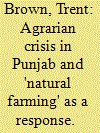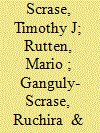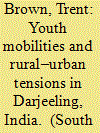|
|
|
Sort Order |
|
|
|
Items / Page
|
|
|
|
|
|
|
| Srl | Item |
| 1 |
ID:
121113


|
|
|
|
|
| Publication |
2013.
|
| Summary/Abstract |
After four and a half decades of Green Revolution agrarian development, the state of Punjab is now, according to many commentators, in a state of social, economic and ecological crisis. In this paper, I interpret this crisis through a Gramscian lens as a 'crisis of authority', in the sense that while the dominant paradigm (the Green Revolution) can no longer provide solutions to the state's most pressing social problems, there is no clear single alternative either. This situation provides a political opportunity for non-hegemonic groups to articulate various other possibilities that address fundamental questions. This paper focuses on the work of one such group, the Kheti Virasat Mission (KVM). KVM is a civil society organisation that promotes 'natural farming' as a solution to the crisis in Punjab: natural farming is a chemical-free method of farming, which relies exclusively on materials available at the local level. This paper looks at KVM's methods of intervening in the crisis situation and examines the difficulties faced at the level of implementation. It argues that KVM's successes and failures highlight the uneven capacities of different classes and social groups to effectively respond to a 'crisis of authority'.
|
|
|
|
|
|
|
|
|
|
|
|
|
|
|
|
| 2 |
ID:
139465


|
|
|
|
|
| Summary/Abstract |
Despite the rapid transformation of India over the past 25 years and a swathe of publications dealing with the impact of globalisation on the culture and economy of the subcontinent, and on its large metropolitan cities, we contend that relatively far less is known about the regional impacts of globalisation and the localised impacts of neo-liberal development policies. Significantly, we seek to understand and analyse how globalisation is transforming smaller, regional towns in India. Based on social scientific research exploring the development and changes taking place in two distinctive, middle towns—Anand, Gujarat and Darjeeling, West Bengal—we highlight the social and political forces at work that are re-making these towns, the local issues residents contend with, and the external drivers of change that influence the unique growth and development of these towns.
|
|
|
|
|
|
|
|
|
|
|
|
|
|
|
|
| 3 |
ID:
144916


|
|
|
|
|
| Summary/Abstract |
Throughout the developing world, rapid urbanization is leading to new social relations and new conflicts between urban and (formerly) rural populations. This paper examines this process of change through a detailed examination of changing rural–urban relations in the town of Darjeeling, in the Himalayan foothills in Eastern India. In Darjeeling, increased rural mobility, accelerated rural-to-urban migration and the increased participation of rural people in local politics have led to major changes in the town. We demonstrate that the upward trajectory of rural classes who were previously subordinate is leading the more established urban residents to feel threatened, resulting in a redrawing of local political issues along rural–urban lines and a reconfiguration of class consciousness and social relations. The urban middle class, whose opportunities in the town have stagnated or declined, see rural migrants as a source of competition for increasingly scarce resources and blame them for the overall decline in the quality of urban life. They mobilize their (predominantly cultural) capital to reinforce markers of cultural distinction between them and the rural migrants and to delegitimize the political gains they have made. We argue that rural–urban conflict is emerging as the chief source of tension in the town and that this tension is largely grounded in class issues.
|
|
|
|
|
|
|
|
|
|
|
|
|
|
|
|
| 4 |
ID:
139468


|
|
|
|
|
| Summary/Abstract |
Globalisation has introduced new sources of mobility for India's youth, yet not all youth experience mobility in the same way. The unevenness of mobility trajectories is especially visible in regional towns, where poor rural migrants and more globally connected middle-class youth occupy the same social space. To illustrate these mobility trends, this paper presents the stories of youths from various backgrounds in the town of Darjeeling, exploring different sources of mobility for rural and urban youth. While rural youth experience some forms of upward mobility as they migrate into the town, urban youth are confronted with downward mobility and are frustrated in their aspirations for professional careers and ‘modern’ lifestyles. For aspiring urban youth, upwardly-mobile rural people are seen as a threat to their privilege, blocking their mobility aspirations. This is contributing towards emerging tensions between rural and urban populations within the town.
|
|
|
|
|
|
|
|
|
|
|
|
|
|
|
|
|
|
|
|
|